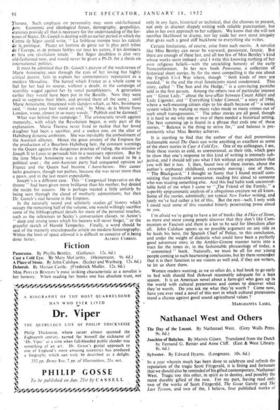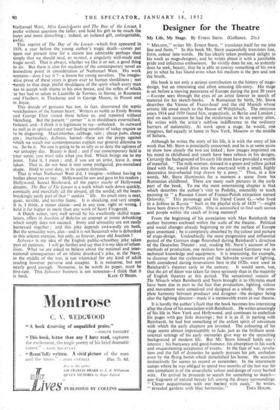Nathanael West and Others
Sylvester. By Edward Hyams. (Longman. 10s. 6d.)
IN a year wherein much has been done to celebrate and refresh the reputation of the tragic Scott Fitzgerald, it is fitting and fortunate that we should also be reminded of his gifted contemporary, Nathanael West. Tragic too, this other, in spirit as in destiny, and possibly the more durably gifted of the two. For my part, having read only two of the works of Scott Fitzgerild, The Great Gatsby and The Last Tycoon, and two of the, I believe, four published Works of Nathanael West, Miss Lonelyaearts and The Day of the Locust, I prefer without question the latTer, and hold his gift to be much the purer and more. disturbing ; indeed, an isolated gift, unforgettable, This reprint of The Day of the Locust—which first appeared in 1939, a year before the young author's tragic death—comes pat 'upon our present time for a reason less admirable perhaps than limply that we should read, or re-read, a singularly well-made and tragic novel. That is always, whether v‘e like it or not, a good thing to do. But there is also for students of the contemporary novel an Immediate point in consideration of Nathanael West. His work contains—dare I say it ?—a lesson for young novelists. The imagin- 'Wye prose of these years is given over to human shoddiness ; not .nerely to that deep, pitiful shoddiness of the spirit which every man has to accept with shame in his own breast, and the reflex of which-- %le has had to salute in Lazarillo de Tormes, in Sterne, in Rousseau 'aid Flaubert, in Thackeray and in George Moore, in Proust and in Joyce. This decade of geniuses has not, in fact, discovered the septic wretchedness of the human heart. Writers as noble as Emily Bronte and George Eliot visited there before us, and reported without blenching. But the present " corner " is in shoddiness externalised, 1tolated, and—I think it is legitimate to say—enhaloed. In outward ins well as in spiritual aspect' our leading, novelists of today require us io be disgusting. Mackintoshes, cabbage, rain ; cheap pubs, cheap itin ; inarticulacy, dullness, hatred—these are the props against ihich we watch our contemporaries explain our general dilemma to I is. So be it. No one is going to be so silly as to deny the ugliness of _Jur unhappy day. Beauty is dead ; and if our contemporary field is your scene, you must take what you find. Which brings me to my point. Take it, I mean and, if you are an artist,, leave it, once taken. That is, do not beat it into some prefigured, pre-moralised shape. Hold to your duty, to its austere demands. That is what Nathanael West did, I imagine—without having to bother about yea or nay. Hollywood he saw and gave to his readers • Hollywood, Sunset Boulevard, all the papier mache of Hollywood dreams. The Day of The Locust is a work which nails down quickly, comically and mercifully all the absurd, all the sordid, all the heart- breakingly seedy part of that " sunkist " life. Its small story is neat, quiet, terrible, and terribly funny. It is shocking, and very simple. It is, I think, a minor classic—and in any case, right or wrong, I hold it far higher in merit than any work of Scott Fitzgerald.
A Dutch writer, very well served by his excellently skilful trans- lators, offers in Joachim of Babylon an attempt at ironic debunking which simply does not succeed. Irony and sensuality are not easily harnessed together ; and this joke depends awkwardly on both. But the sensuality wins, alas—and it is not Susannah who is debunked in this solemn exercise, but only, as forever, poor old Joachim Sylvester is my idea of the English public-schoolboy joke taken past all patience. I will go further and say that it is my idea of infant- ilism.- ,What we are asked to believe about the national and inter- national consequences of an idiotic drunkard's joke, in the Navy, in the middle of the war, is too whimsical for any kind of adult reading however perverse and escapist. It is nonsense, but not nearly good enough. Nonsense, to be worth its paper, must be first-rate. This Sylvester business is not nonsense—I think that it



































 Previous page
Previous page